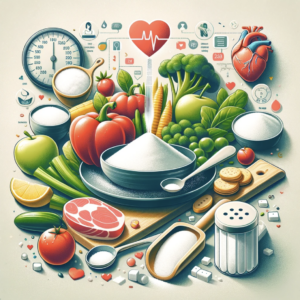Conscious salt consumption is the key to health
Salt, scientifically known as sodium chloride, plays a crucial role in our diet. It provides essential electrolytes like sodium and chloride, necessary for the proper functioning of nerves and muscles.
The Role and Effects of Salt Consumption
 Salt performs several biological functions, including:
Salt performs several biological functions, including:
- Electrolyte balance: It helps maintain proper nerve and muscle function.
- Digestion: It aids in the production of stomach acid, essential for digestion.
- Blood pressure regulation: Salt consumption increases plasma osmotic pressure, affecting the body’s fluid balance and blood pressure.
However, high salt intake can lead to significant health issues, such as hypertension, which is a major risk factor for cardiovascular diseases. In Hungary, nearly half of the population aged 30-79 suffers from high blood pressure, emphasizing the need to reduce salt intake.
Recommended Salt Intake
Adults are advised to consume a maximum of 2g of sodium per day, approximately equivalent to 5g of salt, roughly one teaspoon. Hungarian men and women’s salt intake significantly exceeds this recommendation, contributing to the prevalence of hypertension and other health issues.
Alternatives and Practices for Reducing Salt Intake
There are many ways to reduce salt intake, such as:
- Using spices: Alternative flavorings like fresh or dried herbs and spice mixes can help reduce the amount of salt in dishes.
- Enhancing natural flavors: Methods like slow cooking or steaming enhance flavors, reducing the need for salt.
- Choosing low-salt products: Consuming foods with lower sodium content, such as fresh vegetables, fruits, and natural dairy products, can help maintain healthy salt levels.
Managing salt intake is crucial for health maintenance, especially for those already dealing with high blood pressure. Everyone should consider regulating their salt consumption consciously.
This article is based on information from the Hungarian Dietitians National Association (MDOSZ) newsletter.
Related news
Health is decided at the family table – dietitians show the everyday application of the SMART PLATE® nutritional recommendation
🎧 Hallgasd a cikket: Lejátszás Szünet Folytatás Leállítás Nyelv: Auto…
Read more >Related news
Pálinka, my love…
🎧 Hallgasd a cikket: Lejátszás Szünet Folytatás Leállítás Nyelv: Auto…
Read more >Not a turnaround, but consolidation: an agricultural outlook for 2026
🎧 Hallgasd a cikket: Lejátszás Szünet Folytatás Leállítás Nyelv: Auto…
Read more >








